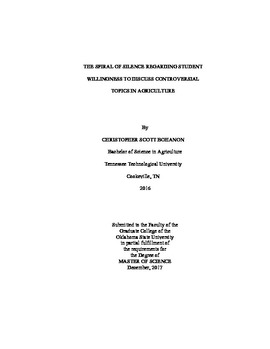| dc.description.abstract | There are many advantages for students who participate in classroom discussion including intellectual development and practice for critical thinking skills (Davis, 1993; Fassinger, 1995). However, only 25% of students actively participate in discussion (Karp & Yoels, 1976). Baldassare and Katz (1996) noted there are many situations in which someone is faced with a decision to express their opinion. Because most studies of the spiral of silence are completed by public opinion researchers and focus on broader issues with larger populations, there is a need to research this theory using different techniques within a diverse group of disciplines (Kennamer, 1990; Neuwirth & Frederick, 2004). This thesis seeks to determine the influence of the spiral of silence theory on agricultural education, communications, and leadership (AECL) students at Oklahoma State University (OSU) in sharing their opinions on current, controversial topics in agriculture, specifically organic agriculture, food labeling regulations, and antibiotic use in livestock. By using Noelle-Neumann's spiral of silence as the theoretical framework, an online questionnaire based on Hayes, Shanahan and Glynn's (2001) instrument was sent to students to evaluate the following potential predictors that might cause a student's submission into silence: (a) public opinion, (b) cognizance, (c) self-efficacy, (d) environment, and (e) demographics. The findings of this study show OSU AECL students believe it is important to know the opinions of others regarding controversial topics in agriculture, more so with people who they are closer to. Students also reported their opinions align more with those involved in agriculture than those who are not. It was also found a student might be more willing to discuss controversial topics depending on their cognizance of each issue and the context or environment in which they find themselves. However, self-efficacy and demographics were not statistically significant predictors in this study. It is recommended future research in this area should focus on concrete observations of actual participant willingness as opposed to hypothetical willingness (Glynn, Hayes, & Shanahan, 1997) used in this study. By observing behaviors pertaining to the spiral of silence, professors could better prepare students to be more comfortable in sharing their opinions. | |
